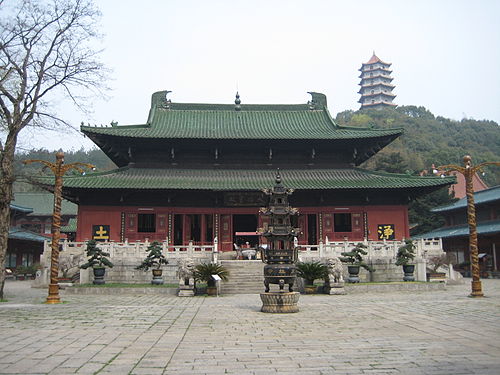
Lushan Huiyuan (simplified Chinese:庐山慧远;traditional Chinese:廬山慧遠;pinyin:Lúshān Huìyuǎn;Wade–Giles:Lushan Hui-yüan; 334–416 AD), meaning "Huiyuan of Mount Lu", was a ChineseBuddhist teacher who foundedDonglin Temple at the foot ofMount Lu inJiujiang province and wrote the textOn Why Monks Do Not Bow Down Before Kings in 404 AD. He was born inShanxi province but moved toJiujiang, where he died in 416. Although he was born in the north, he moved south to live within the bounds of theEastern Jin Dynasty.
Huiyuan was posthumously named First Patriarch of thePure Land School of Buddhism, and founder of the White Lotus Society, an early Buddhist community devoted toAmitabha Buddha. His disciples included Huiguan (慧觀), Sengji (僧濟), and Faan (法安).


Huiyuan began studying theZhuangzi,Laozi, and the teachings ofConfucius at a young age. However, at the age of 21 he was converted to Buddhism inHebei Province by the monkDao An, a Chinese disciple of aKuchan missionary. Hearing the sermons of Dao An convinced Huiyuan to "leave the family" and embark on a life of Buddhist teachings.[1] Later, he foundedDonglin Temple (East Forest Temple) at the foot ofMount Lu. His teachings were various, including thevinaya (戒律), meditation (禪法),abhidharma, andPrajna or wisdom. Although Huiyuan did not take initiative in establishing relations with the secular world, he had contacts with court and gentry families. Huiyuan was on two occasions invited by the dictatorHuan Xuan to take part in discussions about the status of the clergy, whose independence Huiyuan defended. Members of the cultured classes came to live on Mount Lu as Huiyuan's lay disciples to take part in religious life. Huiyuan also upheld a learned correspondence with the monkKumarajiva.[2]
In the year 402 he organized a group of monks and lay people into aMahayana sect known asPure Land Buddhism, the Pure Land being the western paradise of the BuddhaAmitabha.[3]
In the year 404, Huiyuan wroteOn Why Monks Do Not Bow Down Before Kings (沙門不敬王者論).[4] This book symbolized his efforts to assert the political independence of Buddhist clergy from the courts of monarchic rulers. At the same time, it was a religious and political text that aimed to convince monarchs and Confucian-minded ministers of state that followers of Buddhism were ultimately not subversive. He argued that Buddhists could make good subjects in a kingdom due to their beliefs in retribution ofkarma and the desire to be reborn in paradise. Despite the Buddhists' reputation of leaving their family behind for a monastic life, Huiyuan stated "those who rejoice in the Way of the Buddha invariably first serve their parents and obey their lords."[1]
{{cite book}}:ISBN / Date incompatibility (help)